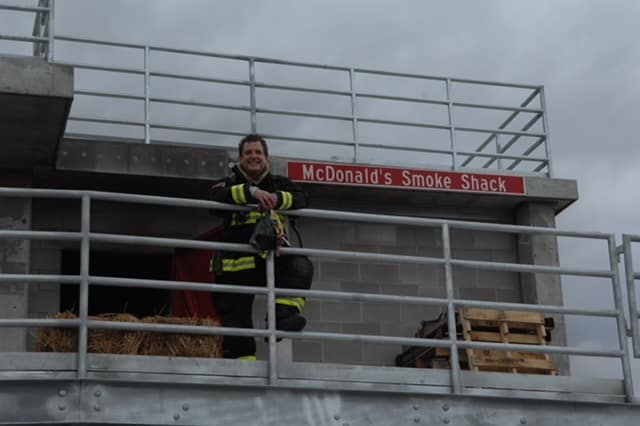
Firefighting is a challenging and rewarding career that requires bravery, physical strength, and mental fortitude. One of the most important aspects of being a firefighter is the work environment. Firefighters work in a variety of settings, from rural communities to bustling cities, and face a range of challenges every day.
As a career firefighter for 31 years, I have lived over half my life in the fire house. I love the team atmosphere and camaraderie. However, I also respect the mental and physical challenges that come with a firefighter career. Firefighters are often called upon to respond to emergency situations that involve danger, chaos, and tragedy. While the physical demands of firefighting are well known, the emotional toll of the job is often overlooked.
In this article, we will explore what the firefighter work environment is like. We will cover the physical demands of the job, the emotional toll of dealing with emergencies. We will also cover the importance of the camaraderie that develops among firefighters.
Physical Demands of a Firefighter
Firefighting is a physically demanding job that requires a high level of fitness and strength. Firefighters must be able to work in heavy protective gear. This gear can weigh up to 50 pounds or more. Firefighters will often carry equipment and tools weighing another 100 pounds or more. All while moving quickly and efficiently in stressful situations. They must also be able to lift heavy equipment, climb ladders, and carry injured or unconscious people to safety. Firefighters work in all kinds of weather conditions, from scorching heat to freezing cold, and may need to spend long periods of time on their feet.
The physical demands of firefighting can take a toll on the body over time. Many firefighters experience injuries or develop chronic conditions. These conditions can include back pain, knee problems, or respiratory issues due to the stress of the job. However, despite the physical challenges, many firefighters find the work incredibly rewarding and are proud of the physical and mental strength they have developed over the years.
Street Smart Firefighting: the common sense guide to firefighter safety and survival. An Exciting New Approach To Really Improve Your Fire ground Operations! Listen to what the fire service leaders have to say about Bob Bingham’s new book, “Street Smart Firefighting.” This book is the most practical, no no-nonsense and “tell-it-like-it-is” resource you will find.
Firefighter Physical Fitness
Firefighters must undergo extensive training to prepare for the physical demands of the job. This includes both classroom instruction and hands-on training. Firefighters learn how to use equipment such as hoses, axes, and ladders. They do this while learning to safely navigate hazardous environments such as burning buildings or chemical spills.
In addition to technical training, firefighters also engage in physical training to build strength, endurance, and agility. This may include running, weightlifting, and other exercises that simulate the physical demands of firefighting. Firefighters must maintain their physical fitness throughout their career to ensure they are able to perform their duties effectively.
To learn more about the physical demands, requirements and physical fitness testing check out my page on Firefighter Physical Fitness.
Firefighter Equipment
Firefighters use a large range of specialized equipment to help them perform their duties safely and effectively. This includes protective gear such as helmets, boots, and fire-resistant clothing. Firefighters also use tools such as axes, saws, and hydraulic tools to cut through walls or roofs and gain access to people or areas in need.
The weight of this equipment can be significant, with firefighters carrying up to 100 pounds of gear at a time. This adds to the physical demands of the job and requires firefighters to be strong and well-conditioned.
Importance of Physical Fitness:
Maintaining physical fitness is critical for firefighters to perform their duties safely and effectively. Firefighters must be able to work for extended periods of time in difficult conditions, including extreme heat, smoke, and poor visibility.
In addition, firefighters must be able to lift heavy objects and carry people to safety in emergency situations. Being physically fit can also help firefighters avoid injuries, such as back strains or sprains, which can result from the physical demands of the job.
I have several articles on firefighter Health and Fitness on page; Health and Fitness.
Being a firefighter is a physically demanding job that requires a high level of strength, endurance, and agility. Firefighters must undergo extensive training to prepare for the physical demands of the job, and must maintain their physical fitness throughout their career. The equipment used by firefighters is heavy and requires strength to carry and use effectively. By acknowledging the physical demands of a firefighter career, we can better appreciate the dedication and commitment required to serve our communities and keep us safe.
Emotional Toll on Firefighters
In addition to the physical demands, firefighting also takes a significant emotional toll on firefighters. Firefighters are often called upon to deal with life and death situations, including fires, natural disasters, and medical emergencies. They must remain calm and focused in the face of danger, even as they witness heartbreaking scenes of loss and devastation
Firefighters are often the first responders to traumatic events such as fires, car accidents, and natural disasters. They witness firsthand the devastating impact these events have on individuals, families, and communities. While firefighters are trained to remain calm and focused in the face of danger, the emotional impact of these experiences can be significant.
Many firefighters experience symptoms of post-traumatic stress disorder (PTSD) or other mental health issues as a result of their work. They may have flashbacks, nightmares, or anxiety related to specific events they have responded to. Some firefighters may struggle with feelings of guilt or helplessness, wondering if there was more they could have done to save lives or prevent damage.
Importance of Support Systems
Despite the challenges of the job, many firefighters find a sense of purpose and fulfillment in serving their communities. However, it is important for firefighters to have a strong support system in place to help them cope with the emotional toll of their work.
Fire departments may offer counseling services, peer support groups, or other resources to help firefighters deal with the stress and trauma of their job. It is also important for firefighters to have a support network outside of work, such as friends and family members who understand the unique demands of their profession.
In addition, fire departments can take steps to reduce the emotional toll of the job. This may include providing training on stress management and resilience, offering opportunities for physical fitness and wellness activities, and implementing policies to reduce exposure to traumatic events whenever possible
Camaraderie:
Despite the physical and emotional demands of firefighting, many firefighters find that the camaraderie among colleagues is one of the most rewarding aspects of the job. Firefighters work in close-knit teams, relying on each other for support and safety in dangerous situations. They often form close bonds with their colleagues, and the fire station becomes like a second home.
Firefighters spend long hours together on shift, sharing meals, stories, and laughter. They may participate in team-building activities, such as training exercises or physical fitness challenges, to build trust and strengthen their bonds. This sense of camaraderie and teamwork is essential to the success of a firefighting team, and many firefighters cite it as one of the most fulfilling aspects of the job.
Check out my post on the 20 Ways to Improve Your teamwork skills
One of the defining features of a firefighter career is the sense of camaraderie that develops between firefighters. This sense of brotherhood or sisterhood is an essential part of the firefighting culture and can have a significant impact on the job satisfaction and well-being of firefighters.
The development of camaraderie among firefighters can begin as early as the training academy. Firefighters undergo intense training together, often living and studying together for weeks or months at a time. This shared experience can create a bond that lasts throughout their career.
Once on the job, firefighters work closely together on a daily basis, responding to emergencies and supporting each other during difficult times. This shared experience and common mission can further strengthen the bond between firefighters.
The sense of camaraderie among firefighters is important for a number of reasons. Firstly, it provides emotional support and a sense of belonging. Firefighters work in high-stress environments and are exposed to traumatic situations on a regular basis. Having a network of colleagues who understand and support each other can help firefighters cope with the emotional toll of the job.
Secondly, the sense of camaraderie can improve job satisfaction and morale. Firefighters who feel connected to their colleagues and are part of a strong team are more likely to enjoy their work and feel a sense of pride in what they do.
The sense of camaraderie among firefighters is a defining feature of the firefighting culture. It develops through shared experiences and a common mission, provides emotional support, improves job satisfaction, and has a broader impact on the firefighting community. By acknowledging the importance of camaraderie, we can better appreciate the dedication and commitment of firefighters and the vital role they play in our communities.
The Challenging and Rewarding Work Environment of a Firefighter is being a firefighter is a demanding and rewarding career that requires a combination of physical strength and mental fortitude. However, the emotional toll of the job can be significant, with many firefighters experiencing symptoms of PTSD or other mental health issues.
It is important for firefighters to have a strong support system in place to help them cope with the stress their work. Fire departments can take steps to reduce the emotional toll of the job and support the mental health of their firefighters. Ultimately, by acknowledging and addressing the emotional toll of firefighting, we can better support those who serve our communities and keep us safe.
What is Human Performance for Tactical Athletes?
Tactical athletes face heightened levels of mental and physical stress daily in order to do their job and keep our communities safe. They have chosen a career that is inherently dangerous, where mistakes can have serious consequences.


